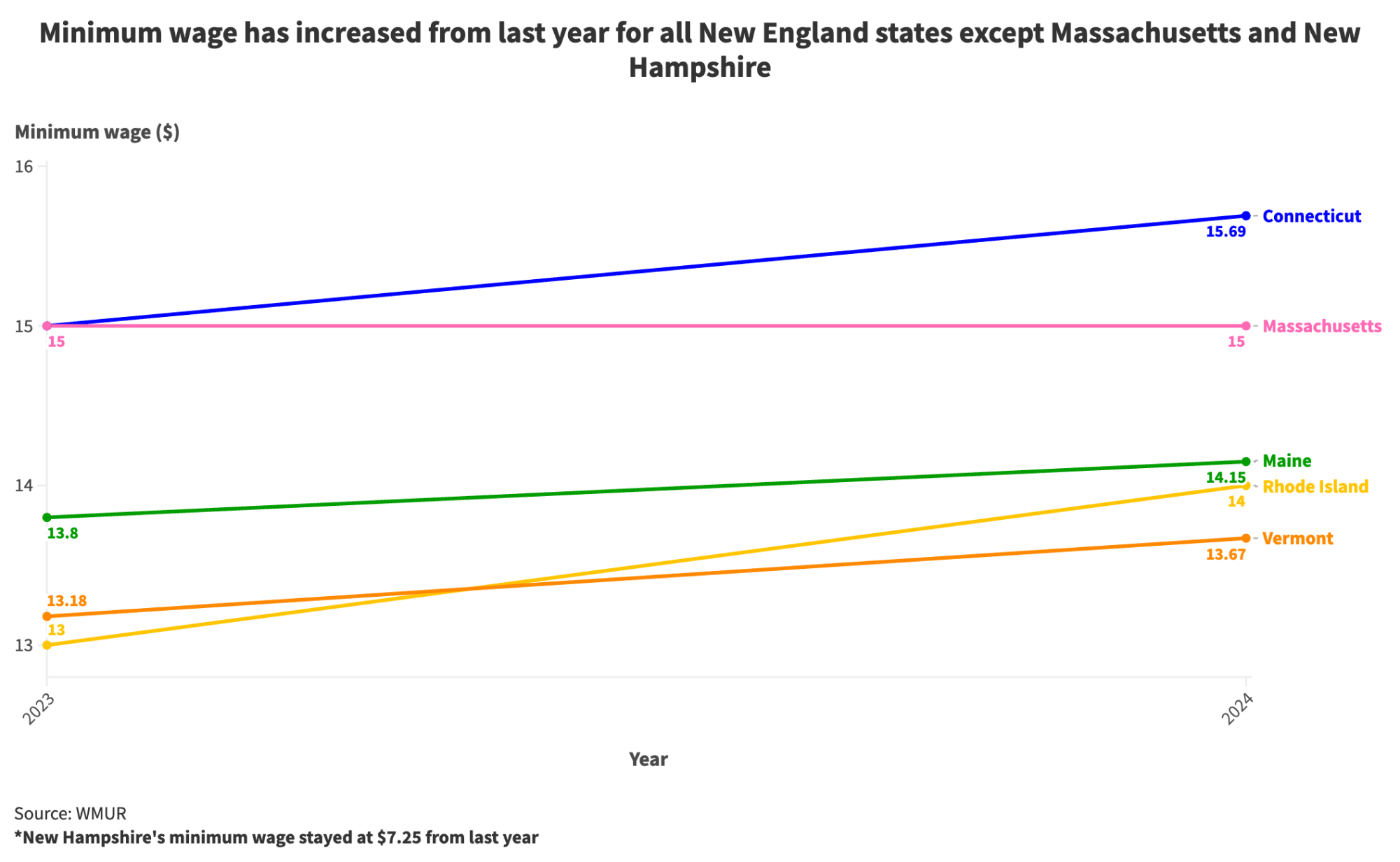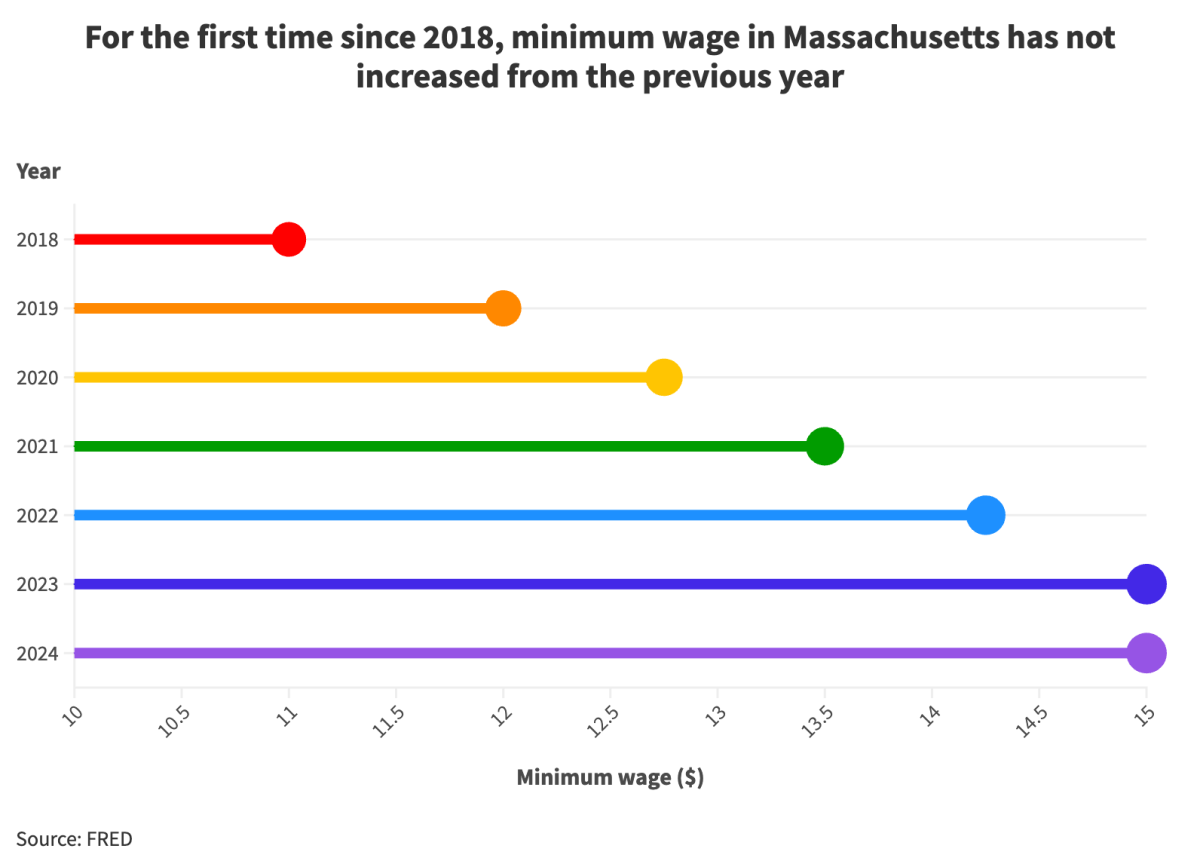For the first time in five years, Massachusetts’ minimum wage did not rise at the start of the new year. It stayed constant at $15 an hour.
This year marks the end of the gradual increase signed into law in 2018 by then-Gov. Charlie Baker. The next push for advocates is raising the minimum wage to $20 per hour.
Raise Up Massachusetts, a coalition of groups devoted to making the state a better place for working people, has been at the forefront of the fight to raise the minimum wage for years.
“The coalition first came together in 2013 and one of our first campaigns was raising the minimum wage, which at that point was $8 in 2013 and hadn’t been raised since George W. Bush was president,” said Andrew Farnitano, a spokesperson for the coalition.
A series of increases over about a decade brought the Massachusetts minimum wage to $15 in 2023. Those increases marked huge wins for minimum wage workers and advocates — and, Farnitano said, didn’t come with the downsides opponents expected.
“In the past, Massachusetts has been a leader on the minimum wage — we were one of the first states to move towards $15 an hour,” Farnitano said. “We’ve seen positive impacts when we passed the $15 minimum wage. Opponents warned that it would mean massive job loss, businesses failing, the state’s economy falling apart. And instead what we saw is the lowest unemployment rate ever recorded.”

Massachusetts no longer has the highest minimum wage in New England — Connecticut surpassed the commonwealth this year with a minimum wage of $15.69 an hour. Following Massachusetts are Maine at $14.15 an hour, Rhode Island at $14 an hour and Vermont at $13.67 an hour. New Hampshire, the only state besides the commonwealth to not see an increase in 2024, has a minimum wage of $7.25.
“What we’ve seen over the past few years is the cost of living in Massachusetts has increased faster than the minimum wage has increased. Due to the rise in inflation, the rising housing costs means that $15 today is not what it was in 2018 when this law was passed,” Farnitano said.
In part because of increasing housing prices and inflation, many believe the minimum wage needs to continue to rise.
“I think, pretty obviously, that it should be higher because then people who are working can get to an income that is livable for themselves,” said Shahinaz Geneid, a fourth-year doctoral candidate at Northeastern’s School of Law.
As a student, limits on work-study funding add a level of complication for Geneid and her peers. When a student is allocated work-study money, there is a cap on what they can earn in a year. The minimum wage comes into play, Geneid said, because low wages force many students to balance multiple jobs at once.
According to an estimate by the MIT Living Wage Calculator, a single person needs to earn $22.59 per hour to cover the necessities in the Greater Boston area.
“I think probably everyone in the [GENU-UAW] union is really supportive of the minimum wage increasing,” Geneid said, referring to Northeastern’s graduate student worker union, of which she is a member.
State Sen. Jason Lewis, who represents the 5th Middlesex District, is the presenter on a bill to raise the minimum wage incrementally over the next five years. It was referred to the committee on Labor and Workforce Development in February 2023. There is a similar bill in the Massachusetts House of Representatives.
“Increasing the minimum wage to $15 per hour has had a tremendously positive impact on hundreds of thousands of working individuals and families in the commonwealth who have seen their take-home pay increase and improve their standard of living. However, due to high inflation, the buying power of $15 has been significantly eroded,” Lewis said in a statement to The News. “This is why we need to start phasing in another increase to the minimum wage in Massachusetts.”
The pending legislation indexes the minimum wage to inflation like some other states.
An increase in the minimum wage to $20 would impact almost 1 million workers, according to the Massachusetts Budget and Policy Center. Nearly 23% of working parents would be affected and only 8% of those who would get a raise are teenagers.
Raising the minimum wage also has the potential to help local businesses, Farnitano said, because it puts money back into the local economy.
“We’ve seen that the minimum wage increase leads to job growth, leads to more employment and because people are working people are earning more money and they’re spending it in their community,” Farnitano said. “It’s not going to corporate profits or offshore bank accounts. It’s staying in our communities and making them stronger.”





![A demonstrator hoists a sign above their head that reads, "We [heart] our international students." Among the posters were some listing international scientists, while other protesters held American flags.](https://huntnewsnu.com/wp-content/uploads/2025/06/image12-1200x800.jpg)











